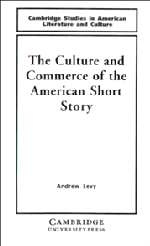Book contents
- Frontmatter
- Contents
- List of Illustrations
- Preface
- Introduction
- 1 Poe's Magazine
- 2 The Land of Definition
- 3 Edith Wharton: The Muse's Strategy
- 4 Handbooks and Workshops: A Brief History of the Creative Writing ‘Revolution’
- 5 Back Home Again: Bobbie Ann Mason's “Shiloh”
- Postscript: Iowa City
- Notes
- Index
- Titles in the series
3 - Edith Wharton: The Muse's Strategy
Published online by Cambridge University Press: 23 September 2009
- Frontmatter
- Contents
- List of Illustrations
- Preface
- Introduction
- 1 Poe's Magazine
- 2 The Land of Definition
- 3 Edith Wharton: The Muse's Strategy
- 4 Handbooks and Workshops: A Brief History of the Creative Writing ‘Revolution’
- 5 Back Home Again: Bobbie Ann Mason's “Shiloh”
- Postscript: Iowa City
- Notes
- Index
- Titles in the series
Summary
In 1925, the year that F. L. Pattee described Poe's review of Hawthorne as “universally quoted,” Edith Wharton published a chapter entitled “Telling a Short Story” in her Writing of Fiction. Wharton's essay has never been widely quoted; in fact, from the opening sentence, in which she turns her back on the nationalist tenor of American short storytelling by observing that “the modern short story seems to have originated … in France,” Wharton seems to be consciously reworking many of the established canons of the genre. It was a task for which she was almost ideally qualified. She published eighty-six short stories between 1891 and 1937, a time span that coincides with the short story's period of widest activity and greatest commercial popularity. Like Poe, she was a literary entrepreneur who attempted to control as much of the narrative transaction as possible, and who attempted to make literature into a paying profession. Unlike Poe, she succeeded to a great extent, earning the equivalent of modern six-figure royalties yearly while writing fiction that captured both critical acclaim and popularity with the deliberate ease of which Poe dreamt in “The Philosophy of Composition.”
In one sense, Wharton's career is a significant, even archetypal, instance of how Poe's vision took corporeal form on the American landscape, and how it was transformed in the process. But Wharton also brought other, significant resources to her own vision of the genre. As her autobiography A Backward Glance indicates, she spent a lifetime consciously and deliberately weighing the relative value of tradition versus the necessity for social change.
- Type
- Chapter
- Information
- The Culture and Commerce of the American Short Story , pp. 58 - 76Publisher: Cambridge University PressPrint publication year: 1993



